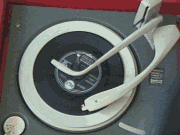 The manager of The Beatles, Brian Samuel Epstein was born to Harry and Malka Epstein on September 19, 1934. His father called his mother "Queenie" because Malka is the hebrew word for "queen". Next to the furniture store that the Epstein family owned was The North End Road Music Stores. James McCartney Sr.'s family was one of the local families that bought pianos there on time. The Epsteins later expanded and took over NEMS.
The manager of The Beatles, Brian Samuel Epstein was born to Harry and Malka Epstein on September 19, 1934. His father called his mother "Queenie" because Malka is the hebrew word for "queen". Next to the furniture store that the Epstein family owned was The North End Road Music Stores. James McCartney Sr.'s family was one of the local families that bought pianos there on time. The Epsteins later expanded and took over NEMS.When Brian started to work at the family furniture store in 1950 at 16, it was soon discovered that he was a born salesman. In 1954 when NEMS expanded from pianos and wireless sets to grammophone records, his father put Brian in charge of the new record department. Brian tried a brief stint as an actor, and then filled jobs at the successive new NEMS stores as the family business expanded.
Brian, who had been selling the music publication Mersey Beat since its first issue on July 6, 1961, became interested in the local music scene, and asked its editor Bill Harry if he could contribute a record column. His first column appeared in the third issue on August 3, 1961.
Legend has it that Brian was working behind the counter to help out with the weekend rush at the Whitechapel NEMS store on October 28, 1961, when Raymond Jones, a regular NEMS customer, came in and asked Brian for My Bonnie by The Beatles. Being billed as "The Finest Record Selection In The North", it was NEMS policy that if a record was available they could get it, and this caused Brian to search out the Beatles. However, in truth, Brian already knew about the Beatles, being that they were constantly featured in Mersey Beat, and it was probably Bill Harry who suggested that Brian go down to see them at the Cavern, where the boys were playing to enthusiastic crowds. Ironically, the Cavern was just around the corner and across Whitechapel from NEMS where Brian was working.
 It was decided that Brian would be the Beatles' manager at a meeting on December 10, 1961. Their first contract was for a five year period. The contract was formally signed at Pete Best's house on January 24, 1962, with Alistair Taylor, Brian's assistant, as witness.
It was decided that Brian would be the Beatles' manager at a meeting on December 10, 1961. Their first contract was for a five year period. The contract was formally signed at Pete Best's house on January 24, 1962, with Alistair Taylor, Brian's assistant, as witness.Brian changed the Beatles' appearance to more professional suits and told them not to smoke or swear on stage. After being turned down for a recording contract for the Beatles by Ron White of EMI and Mike Smith of Decca in late 1961 and January 1962, he finally secured a contract for them with George Martin at EMI's Parlophone label in June 1962.
After the success of the Beatles, Brian also managed other acts, including Gerry and the Pacemakers, Billy J. Kramer, Cilla Black, the Fourmost, the Big Three, the Remo Four and Tommy Quickly. Among other TV appearances in Britain, Brian also appeared as the London correspondant on the American TV show Hullabaloo.
Brian tragically died in 1967 from an accidental drug overdose.































No comments:
Post a Comment